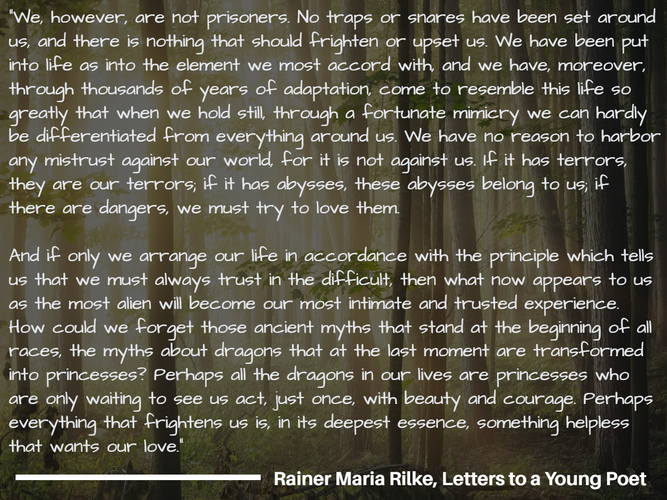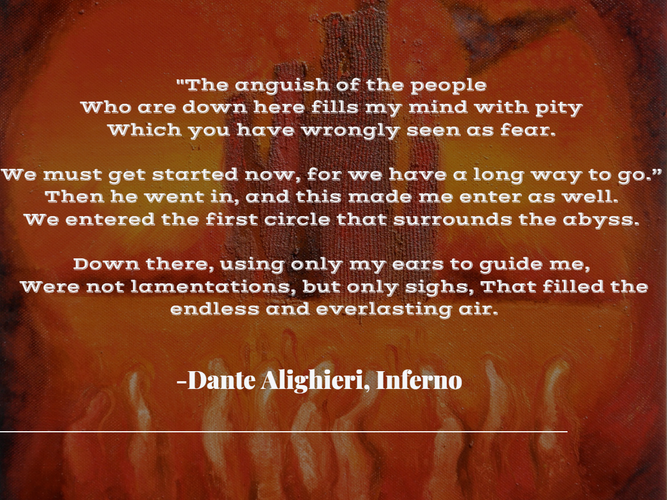
We are now discussing a most serious and sensitive topic in an impartial and dispassionate way. This topic comes with many preconceptions and prejudices in our modern culture. Still, if we approach it with good will, seeking only understanding without judgment - illumination without prejudice - I trust that it can be of value for those who persist. The topic is "Hell". I am not asking anyone to 'forget' all that they have ever thought about Hell, because that is impossible. Instead, I am requesting that readers attempt to take those preconceptions and imbue them with a new life - a new depth of meaning - through our shared exploration. We will first briefly set a few foundations for our topic, so that it becomes more clear why none of what follows is purely speculative opinion or argument, but reasoned observation from our concrete experience. In a previous essay, we discussed how the spatial dimensions we perceive are intellectual representations of meaningful duration; that those spatial dimensions are entirely subconscious representations of meaningful purposes and goals. In the words of Henri Bergson, "intellectualized time is space... the intelligence works upon the phantom of duration, not on duration itself... the elimination of time is the habitual, normal, commonplace act of our understanding...". When we think intellectually, we fix phenomena in time, via space, for quantitative analysis.
It is very difficult for the intellect to wrap its head around this concept, because the intellect is the one 'eliminating' duration for its analysis of the concept. We can sense this difficulty with a simple exercise: picture to yourself the image of an apple falling. Easy, right? Now, try to picture the act of 'falling' without any corresponding object that is falling. We cannot picture that act in our minds and we will even find it difficult to sense the meaning of 'falling' without any object. By focusing on this non-visual meaning of 'falling', in a holistic rather than analytical way, we can sense a dim idea of 'durational separation' which occurs without spatial dimension. That is how, according to Bergson, we start to "pass from intellection to vision, from the relative to the absolute... getting back into duration [and] the very mobility which is its essence.” Why is it that Dante's vision of the Inferno has stood the test of time for 700 years now, imprinting itself within the collective Western imagination? It is because his thoughtfully poetic narrative embeds a shared imagery which speaks to our understanding of Hell, not in the spatialized language of a 'place' or one-off 'event', but in the living and durational language of process. It speaks in the poetic language of digressing, descending, and devolving. The richly symbolic narrative provides us the inner meaning of non-spatial falling.
Hell is the continuation of humanity's Fall, recounted across all the world's mythic traditions. The 'hellish' state occurs within the physical and spiritual planes which are interwoven and enmeshed. It is an unnatural progression because human individuals now have the capacity to evolve back to the spiritual rather than descend further into the physical, if they so choose. There are quite a few people who, however, will never consider the 'falling apple' exercise above. They will never make the distinction between the intellectual elimination of time and the higher vision of meaningful duration because they are unaware that this distinction exists. Instead, many people will remain spellbound to the narrative that their intellectual theorizing can lift them into higher spheres of integral meaning. What I am writing here is by no means an original argument. In the 1920s, Rudolf Steiner had already cautioned, "People must become thinking people instead of thinking machines." A few decades later, Martin Heidegger gave a series of lectures rooted in the premise, "we [humanity] are still not yet Thinking." Around the same time, Owen Barfield commented, "Thought – and indeed anything mixed with thought – we now feel to be no more than a shadow hovering over the surface of something more solid."
"For whoever has, to him more shall be given, and he will have an abundance; but whoever does not have, even what he has shall be taken away from him."
- Matthew 13:12
- Matthew 13:12
This verse above reflects the "Matthew Principle", which is considered one of the most "unjust" in all of the New Testament. It does not seem in keeping with the pleasant and egalitarian nature of the Jesus who is portrayed in the Gospels; the Jesus who went around blessing the "least of these" and the "poor in Spirit". Instead, it seems much more in keeping with the 'judgmental' Jesus of the Apocalypse (Book of Revelation), whose angels proclaimed, "... and the smoke of their torment ascends forever and ever; and they have no rest day or night, who worship the beast and his image, and whoever receives the mark of his name." (14:11). Verses like these make clear that, if we desire more penetrating insights into the Spirit of the text as a whole - the Spirit which rests at the base of Western civilization - we must ascend to meet that Spirit in our own thoughtful effort. It's meaning will not simply occur to us as it does when we are in a state of dreaming. Instead, we must awaken to its meaning from within so that we can perceive that meaning in full clarity of consciousness. That is how the 'top-down' grace of the Spirit naturally comes into contact with the 'bottom-up' thought-works of man. It is how we "will be caught up together with [the dead in Christ] in the clouds to meet the Lord in the air." (1 Thessalonians 4:17)
Take notice of how the Apocalypse, like Dante's later visions, reveals to us an ongoing process of infernal descent which unfolds in stages of increasing intensity. God's judgment against the wicked unfolds in sevenfold stages reflected in the churches who are addressed, the seals opened, the trumpets blown, and the bowls of wrath poured out. Throughout the whole process, the themes of repentance, redemption, and resurrection that we find in the Gospels and Epistles are also implicit, since there is still further for the souls to descend at each stage. Yet we also approach a sense of 'finality' as we cross the verse: "Here is wisdom. Let him who has understanding calculate the number of the beast, for it is the number of a man: His number is 666." (13:18). It is not necessary to discuss this in any more detail for our purposes. We can simply observe that there are seven nested processes of evolution imaged in the Apocalypse, and the 'number of man' appears to correspond with the sixth stage of three different ones. Perhaps this relates to the saying, "the third time's the charm"? The main point being that, even when evolutionary paths diverge due to the Matthew principle (discussed below), each individual has plenty of opportunities to free their 'fate' from the course of strict necessity.
The Matthew principle reveals a patterned progression within both nature and culture. Whenever productive activity is involved, especially creative activity engaged voluntarily, in a 'free market', the Matthew principle holds firm. A small number of musicians have created the vast majority of commercially successful musical hits; a small number of athletes have won the lion's share of professional accolades; a small number of scientific papers are cited much more than all the rest combined. These examples could continue endlessly in practically every domain of human productive activity. Yet it cannot be explained away as a product of mere socioeconomic factors, because it can even be observed in the function of natural ecosystems and the formation of galaxies and solar systems. It is not a moral dictum spoken by Christ incarnate, then, but a revelation of how Cosmic Logic (Logos) unfolds. This revelation is disappointing, on the 'left hand' (subconscious), because it speaks of paths which must necessarily diverge, but it should also be uplifting, on the 'right hand' (conscious), because it speaks to the concrete overlap between human and Divine creative activity. In the words of Barfield, it speaks to how, "in the course of the earth's history, something like a Divine Word has been gradually clothing itself with the humanity it first gradually created - so that what was first spoken by God may eventually be respoken by man."
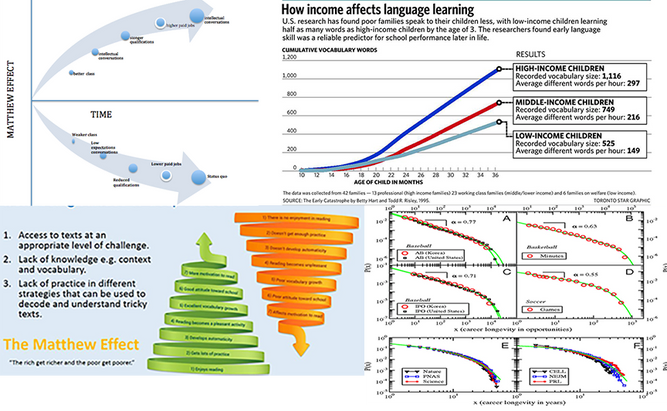
Creative activity, whether in economics, science, art, education, or any other field, always requires thinking. In the experience of most people, it requires either intellectual cognition (prosaic thinking) or what Samuel Taylor Coleridge referred to as 'secondary imagination' (poetic thinking). It is our thinking which integrates our individual existence into the Cosmic whole by perceiving the laws, principles, and archetypes (the spirit) which underlies the fragmented sense-phenomena of the world. What the Matthew principle points to, then, is how optimal thinking-choices lead to cycles of positive feedback and suboptimal thinking-choices lead to cycles of negative feedback. Put another way, our optimal and suboptimal decisions will compound over time, just like interest compounds on a debt balance. That dynamic is deeply related to the fact that we will experience more pain from a loss than we will experience pleasure from a gain. For our purposes here, we will define "optimal" as those thinking-choices which integrate more spheres of meaning in various domains of life, and "suboptimal" as those which leave them relatively more fragmented from each other. The former stimulates the positive reinforcement of thinking-pleasure and the latter disproportionately stimulates the negative reinforcement of thinking-pain.
When novice filmmakers perceive the meaningful commonalities between music and narrative storytelling, for example, they are more likely to weave a coherent and richly meaningful experience for their viewers. That, in turn, will mean more people view their content, their advertising share increases, and more funding opportunities are made available for them to continue their creative activity. Their confidence, motivation, and inspiration is boosted, fueling further thinking-advances. On the flip side, the novice filmmaker who simply mirrors previous works, and fails to thoughtfully integrate diverse spheres of meaning, will quickly find opportunities being foreclosed upon. He will find it harder and harder to acquire new funding for his projects. After a short while, he will experience negative emotions which feed off of each other and decrease his confidence, motivation, and inspiration. The paths of these two novice filmmakers will become increasingly more divergent, creating an evolutionary chasm which is quite large. Their paths will also feed into the evolutionary outcomes of many other people they are coming into contact with in their pursuits. Indeed, whether we like it or not - whether we consider it 'fair' or not - "the rich get richer and the poor get poorer" through these positive and negative feedback loops within the physical plane.
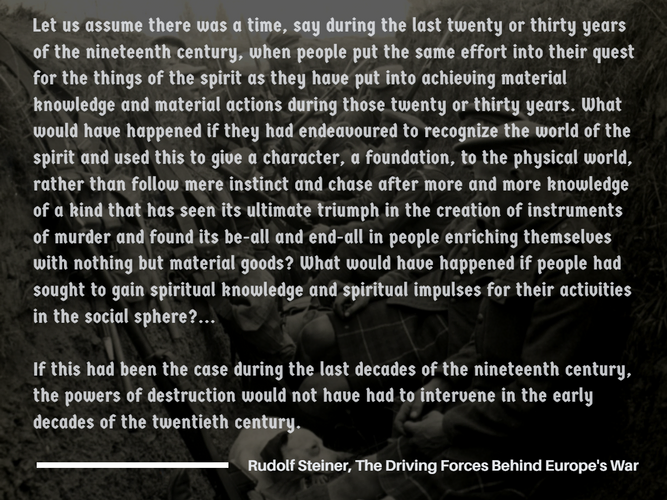
We can now observe, then, that the Matthew divergence is truly a 'principle' of our Cosmic evolutionary progression at many different temporal scales. If we pay close attention, then we will also perceive ourselves going through these rhythmic cycles of positive and negative thinking-feedback in our own careers and personal lives; perhaps even in our monthly, weekly, and daily experiences. Every day we experience a descent into the trenches of the material world when we awaken from dreams and sleep, moving from rich and fluid imagery to dim and rigid sense-perceptions. We must then engage these perceptions in 'battle' with our thoughts as the day unfolds, so as to make sense of them at higher levels of meaningful integration. At the same time, we are constantly awakening from a hazy dream-consciousness into the clarity of waking ego-consciousness. Every new day brings with it a resurrection into more meaningful spheres of integrated meaning, embedding the experiences from all of our previous days within itself. The Kingdom of Heaven manifests for us more and more as we become more and more conscious of this evolutionary progression that we are participating in. It is through this spiritual evolution that the 'opposites' represented below are gradually united in our experience; that the spiritual awakens to itself from within the physical; that our qualitative thinking makes Heaven out of hell.
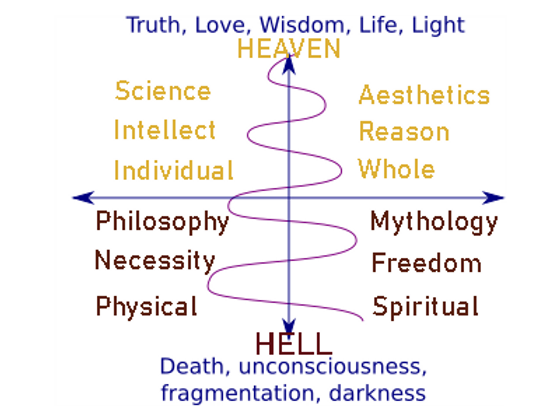
h/t Cleric
The Matthew principle points us towards the fundamental asymmetry of evolution, i.e. how the horizontal dualities above can only be united through our conscious ascension on the vertical axis. A living organism which gains a thinking-selection advantage over other organisms in its thought-environment is more likely to leverage that advantage into further ones. Unlike the strictly physical (spatial) evolutionary model, however, the spiritual (durational) evolutionary understanding recognizes that the selection forces are not entirely arbitrary or external to us. It is our own thinking activity and moral orientation, nested hierarchically within the archetypal durations of even higher activity and ideals, which selects for our evolutionary outcomes. When that activity and those ideals are mostly subconscious, we call the outcomes "unfair", and when they are mostly conscious, we call them "fair". As Carl Jung observed, "until you make the unconscious conscious, it will direct your life and you will call it fate." That is the message we also find coursing through the veins of Western scripture; the message that every individual is responsible for the 'sins of the world', i.e. the lack of qualitative knowledge about its spiritual relations, and must bear his or her own Cross through the power of the Thinking-Spirit as they tread in the footsteps of Christ, ascending to the summit of Golgotha.
When one person kills another in a state of relative 'unconsciousness' - for ex., when intoxicated or in the heat of rage - as opposed to killing with calculated premeditation, we say that the former has less culpability. We still think, however, that he is deserving of some punishment. That reflects our intuition that human individuals have increasingly gained the capacity to make the subconscious more conscious. When we remain thinking in a qualitative manner, there is always the possibility of repentance and redemption from the negative feedback loops into evolutionary dead-ends. Keep in mind that "death", in this ideal evolutionary understanding, is an image of unconsciousness. We don't vanish from existence when we physically die, or go off into another spatial realm of 'heaven' or 'hell', but rather our lawful evolution continues on between death and rebirth. This ideal evolution cannot proceed if we are no longer thinking, i.e. if we have squandered the capacity to remain conscious within the post-death duration. The process of reincarnation is generally shunned by intellectual theology, but it is the only logical option to make sense of how all souls participate in the evolutionary Christ-impulse, i.e. the making of what is unconscious more conscious, regardless of when or where they were born in any particular incarnation.
The phantom layer of abstract intellectual cognitions, however, works to exclude souls from the evolutionary impulse. It imprisons us within entirely circular loops of reasoning, with each abstract concept only pointing to another equally abstract concept or back at itself. Some of the loops have larger circumferences than others, i.e. some intellectual models have been spread out more horizontally, giving us the illusion of new meaning, but they all eventually circle back to the same thought-point at which they started. They all 'close the loop' at some point, so no truly novel or overarching meanings can be incorporated within their circular logic. These infernal loops are actually necessitated by any philosophy which denies, implicitly or explicitly, the capacity of our thinking activity to rise up and meet fundamental truths of existence. Given that so many modern philosophies have made exactly that denial, we have great cause for concern going forward. Below is an infernal loop which, despite appearing so simple and originating in the 18th century, still captures the most prevalent epistemic worldview in Western culture. To seek holistic understanding, rather than unhelpful judgment, we should try to penetrate into the flow of the abstract argument with our thinking; to sense how one thought leads to another, then another, then another, and to the conclusion out of strict necessity.
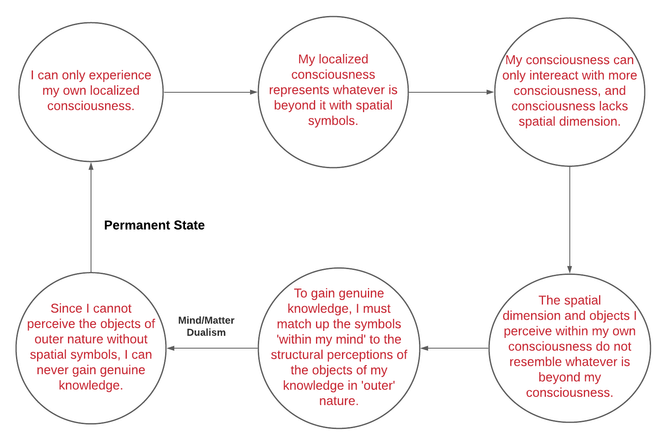
On the last leg of the loop, it is permanently sealed and there is no escaping the loop through more abstract concepts, assuming they are consistent with the ones already present. No matter how much more complex the conceptual argument becomes, it will always lead back to the conclusion - "I can only experience my own localized consciousness (permanently)". This flowchart is not exhaustively accounting for the actual concepts invoked in the arguments, but rather it is distilling the core philosophical concepts into their essential meanings so we can more easily perceive how the thought-progression unfolds. Going from particularized concepts on the surface of a worldview to their deeper layers of meaning is a reliable way to begin extricating ourselves from the horizontal flow and gain a higher vantage point on it. We are seeking to sympathize deeply with the pattern of thinking, not by adopting the pattern for ourselves (we already have this dualistic habit of thinking), but the exact opposite. We can only begin to understand a flow pattern of thinking activity after we have managed to rise above that flow to some extent. We cannot understand the experience of "hotness" until we have experienced a few varying degrees of temperature; likewise, we cannot understand infernal thinking loops until we have experienced their functioning across several worldviews.
From this foundational Kantian infernal loop we observed above, many other ones emerged as derivatives in the 19th and 20th centuries. There is the Marxian loop, which concludes that our own ideas are only reflections of our socioeconomic status at any given time. Instead of the physical (material) acting as a reflection of the spiritual (meaningful), the relationship is inverted. The strict necessity of material relations is given priority as the determining factor of our evolution, because the spiritual element (qualitative thinking) has been excluded from the loop. Then there is the Freudian loop, which concludes human civilization and all its 'discontents' can be reduced to unconscious sexual desires. These are considerd base physical desires which we cannot ever get to the bottom of via thinking and, therefore, we cannot understand more deeply so that they can be transfigured into their higher meaningful essence. We also have the Nietzschean loop, which is more nuanced, but has been adopted by many thinkers as a reduction of human ideals, such as moral meaning, to a "will-to-power" within the physical plane. There is also the 'post-structural' linguistic loop, which concludes all word-symbols are merely pointing to other word-symbols with no deeper layers of meaning discernible to our systematic thinking, i.e. there can be no archetypal 'meta-narratives' of the sort Dante envisioned in his Divine Comedy.
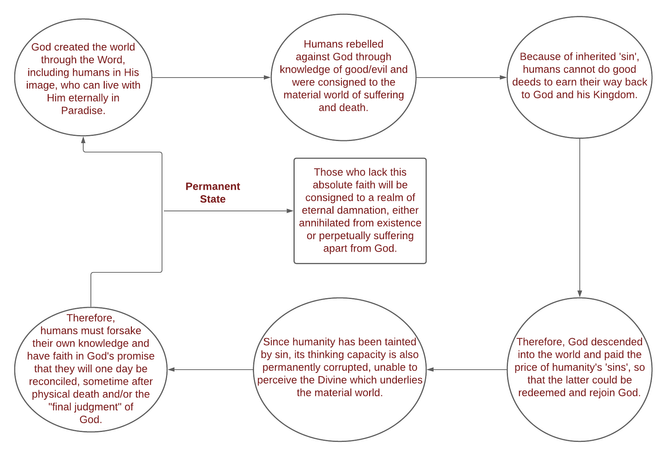
It should be clear that the concepts in these loops are not fundamentally "wrong", but rather they are incomplete because they remain within a flattened and circular plane of thinking. What is common to all such loops? They all lethally undermine the central role and efficacy of our own thinking activity . Moreover, they all force the person engaged in the loop to rely on increasingly more abstract concepts as they seek more understanding. The religious fundamentalist, for example, must perpetually generate doctrines and dogmas, with endless intellectual interpretations, to remain relevant in any spiritual conversation. That is because the other alternative - direct perceiving and knowing of what the doctrines are symbols for - has been excluded from the thought-loop. None of these infernal loops are logically necessary or warranted from our given experience. They are simply the consequence of an intellect which has subconsciously decided to stop reasoning through its experience whenever reaching its subconsciously desired conclusion. It is the software program repeating or terminating itself once it has cycled through its pre-programmed code. Below is a crude illustration of what a 'paradisiacal' loop could look like for the intellect which comes to understand itself deeply and thereby transcend its own strict necessity. It spirals from flattened conceptions to three- and four-dimensional imaginations of qualitative meaning, without forsaking any of the quantitative resolution gained by the intellect.
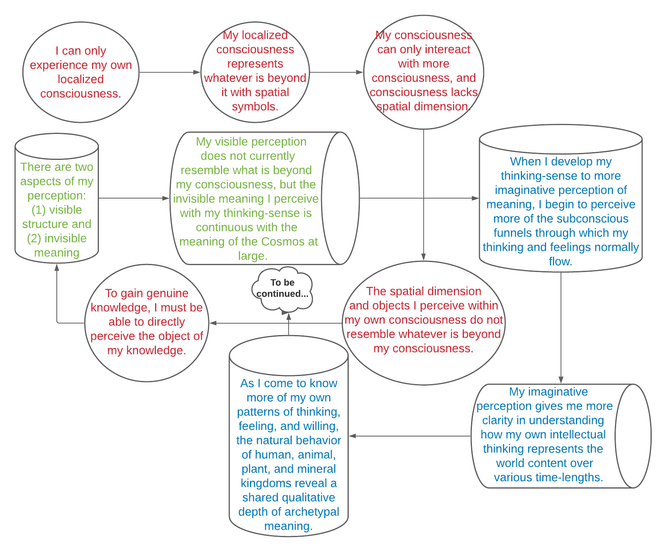
When we remember that intellectual loops which present to us in a spatial way are actually loops of meaningful duration, it should become more evident why there is a more-than-metaphorical connection between circular infernal loops of the abstract intellect and the ceaseless torment Dante and others have envisioned within the rungs of 'Hell'. It is no coincidence that we all share a deep anxiety concerning the mechanistic routines of modern material existence. We dimly sense that we are stuck in our own version of the movie Groundhog's Day; that our existence cycles through an endless loop of flattened meaning. No matter what we do or how we do it, the Newtonian clock resets and we cycle through the same basic meaningful experiences once again. How much novelty do we actually sense in the meaning of our experience as our adult life unfolds from day to day; as we wake up, brush our teeth, drink our coffee, check our phones and computers, commute to school or work (or, increasingly, study and work from home), eat our lunch, finish our classes or work, eat our dinner, hit the gym (maybe), watch our favorite TV shows, periodically check our social media throughout the whole process, and eventually get to sleep? Are we truly alive or are we merely simulating abstract conceptions of "life" with our intellect?
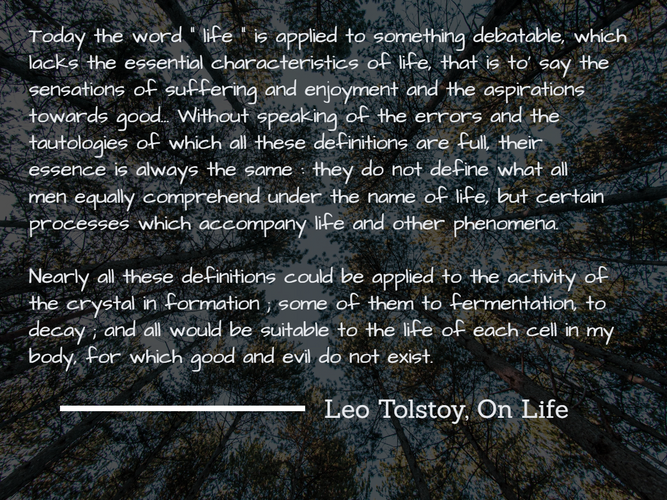
This concern over the mechanization of life really took shape in the early to mid-19th century, in thinkers such as Goethe, Emerson, Dostoevsky, Tolstoy, Nietzsche, and others, and it has become increasingly more intense ever since. In the last few decades, especially, we have seen the explosion of cultural commentaries on this 'rat race' of our mechanized existence, but very few commentaries on why it exists and even fewer on what concrete steps we can take to move beyond it. There is nothing wrong with set routines, per se, but there is also nothing which precludes the mining of novel meaning from those routines except our own resistance to more imaginative thinking which spirals upwards. The lack of novel experience is not a fixed law of reality, but a natural consequence of our own intellectual thinking-choices which negatively feedback into each other and spiral downwards at an accelerated pace. Even more worrisome is that, as the intellectual loops grow more complex to create the illusion of novel experience and meaning, the actual meaningful aspect of the loop appears to be growing smaller. It is as if we are approaching a 'singularity' when we will repeat a single moment of meaningful existence - perhaps a painful and dreadful moment - for all eternity.
We can't dismiss these imaginations of modern cinema as mere 'fancy' any more than we can dismiss Dante's vision of the Infernal realms. The motive behind the horror is often to sell more content, but these imaginative stories have a life of their own which extends well beyond the localized interests of whomever manifested it in the world. Owen Barfield reminded us that, "when appraising the aberrations of the formally representational arts... in so far as they are genuine, they are genuine because the artist has in some way or other experienced the world he represents." By 'formally representational', Barfield is referencing those artistic creations which mostly mirrored the quantitative forms of outer appearances. Artistic endeavors which focus on the nature of Time-experience are practically 'non-representational' in this sense. They are dealing with a topic that it only became possible to explore deeply in the last 120 odd years. The Time Machine, written by H.G. Wells in 1895, is considered to be the original artistic treatment in that connection. The intellectual and imaginative obsession with 'time-travel' has only intensified since then. If someone were to ask us, "what would you consider to be the experience of Hell?", then the clip above would rank quite high on our list. Total unconsciousness would be preferable, because at least then we would no longer know how dreadful our fate had become.
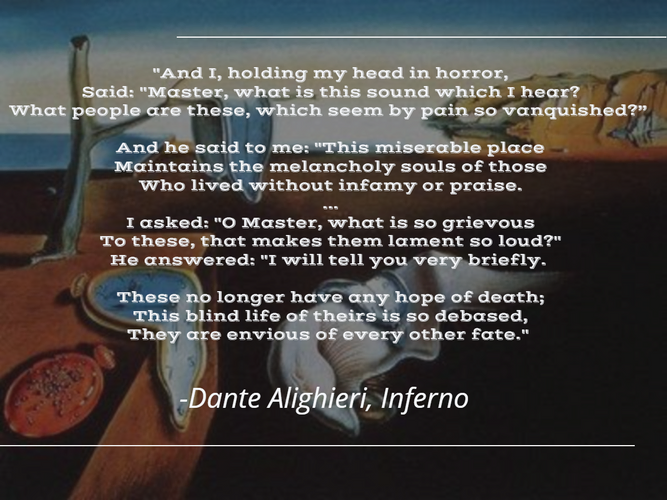
Our greatest hope, however, is in the fact that our imaginative awareness of what the Infernal realms are, in their durational essence, takes us a major step down the progressive evolutionary path leading away from the dreadful experience of those same realms. This awareness reflects the spiritual seed of our Thinking-organism which houses the potential of our entire future becoming; our evolving away from the forces of darkness, unconsciousness, fragmentation, and death. The further we evolve by nourishing that seed within us, with deep and disciplined thought, the more unlikely it becomes that our Thinking-organism will succumb to the forces of devolution. The poor can only become poorer in the physical (spatial) world with limited material resources, i.e. in a zero-sum game. Within the higher meaningful realms of the spiritual plane, these resources are no longer a limiting factor for the beings who consciously participate and cooperate to make the Cosmic evolution possible. In these realms, there is only the poor in Spirit becoming more rich in Spirit, if they so choose. There are beings who consciously ascend from the Inferno of the physical plane to the Purgatorio and Paradiso of the higher spiritual realms consisting in imaginations, inspirations, and intuitions. By accessing these realms of ideation, "...we all, with unveiled faces, beholding as in a mirror the glory of the Lord, are being transformed into the same image from glory to glory."
I must admit, my desire to lessen the fright of our unfolding Apocalypse played no small part in my motivation to write this essay. As always, we can only confront our terrors, whether they are localized or Cosmic ones, by knowing them deeply. This path of qualitative knowledge will only become as complicated as we ourselves make it. If we find it difficult to imagine right now, then it is only because we have made few, if any, genuine attempts to imagine it. Once we seek first the Kingdom of God in righteousness, we ascend along the 'low-entropy gradient' of the qualitative Sun and the hyper-complex phenomena which surround us - our own living organism most of all - become more simple to understand. Our understanding then compounds in ever-greater proportion with our good will and qualitative thinking effort. It becomes a boon not only to our own localized interests, but to the collective interests of all 'idea-beings' who evolve the Cosmic organism. We even learn to love our 'enemies' who are currently working towards our devolution; to one day redeem them from their own descent into the abyss of unconsciousness. That is when we come to realize the deeper significance of the doctrine, Imatatio Christi. It is no longer an intellectual dogma for us, but instead it becomes a reality to be experienced and embraced in full consciousness.
